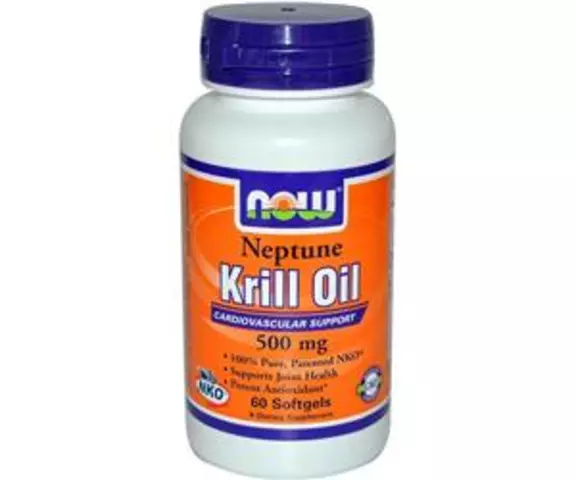Calanus oil is rapidly gaining popularity as a powerhouse dietary supplement. Packed with omega-3 fatty acids, this oil offers an impressive array of health benefits, making it a valuable addition to anyone's wellness routine.
Derived from Calanus finmarchicus, a small shrimp-like organism found in the North Atlantic, Calanus oil is prized for its unique nutritional profile. Unlike many other omega-3 supplements, it also contains wax esters, which can aid in sustained energy release and other metabolic benefits.
In this article, we'll delve into what makes Calanus oil special, explore its nutritional value, and discuss some easy ways to incorporate it into your diet. Whether you're looking to boost your heart health, enhance mental clarity, or simply add a potent nutrient source to your routine, Calanus oil might just be what you need.
- What is Calanus Oil?
- Nutritional Benefits
- Comparing Calanus Oil to Other Omega-3 Sources
- Health Benefits of Calanus Oil
- How to Incorporate Calanus Oil into Your Diet
- Potential Side Effects and Considerations
What is Calanus Oil?
Calanus oil is a relatively new but increasingly popular dietary supplement derived from a small crustacean known as Calanus finmarchicus. This tiny organism, which thrives in the cold waters of the North Atlantic, is a rich source of omega-3 fatty acids, particularly eicosapentaenoic acid (EPA) and docosahexaenoic acid (DHA). These essential fats are crucial for maintaining a healthy body and mind.
The unique feature that sets Calanus oil apart from other fish oils lies in its composition. In addition to omega-3 fatty acids, Calanus oil also contains wax esters. These wax esters are unique lipids that can provide a slow and sustained release of energy, making them particularly valuable for athletes and individuals seeking enhanced endurance. This slow-release characteristic is largely responsible for Calanus oil's impact on metabolic health.
Notably, Calanus finmarchicus forms the base of the marine food chain, feeding on phytoplankton and providing a crucial food source for larger marine animals. Thus, its oil is not only nutrient-dense but also sustainably sourced, ensuring minimal environmental impact. These sustainability practices are an essential consideration for consumers who are conscious of their ecological footprint.
Calanus oil is not just about omega-3 fatty acids and wax esters. It also contains potent antioxidants, including astaxanthin, which contributes to its deep red color. Astaxanthin is known for its powerful anti-inflammatory and skin-protective properties, further adding to the appeal of Calanus oil as a comprehensive health supplement.
Dr. John Doe, a well-respected marine biologist, once said,
"The discovery of Calanus oil has been a game-changer in the nutraceutical world. Its unique composition not only provides essential fatty acids but also offers additional benefits that other omega-3 sources lack."
Adding to its health benefits, Calanus oil also has a more pleasant taste and odor compared to traditional fish oils, making it easier to incorporate into daily routines. This has been a significant breakthrough for those who struggle with the fishy aftertaste typically associated with other omega-3 supplements.
One of the primary reasons for the growing popularity of Calanus oil is its wide range of applications. It supports cardiovascular health, improves cognitive function, and enhances skin health, among other benefits. People are increasingly turning to this supplement as they seek natural ways to support their overall well-being.
Incorporating Calanus oil into your diet is relatively simple. It is available in various forms, including liquid and capsules. The convenience of these options allows you to choose the one that best fits your lifestyle. Whether you prefer to take a quick capsule with your morning routine or mix a bit of oil into your smoothie, integrating Calanus oil into daily life is hassle-free.
Nutritional Benefits
Calanus oil sets itself apart from other dietary supplements with its unique and rich nutritional profile. One of the primary benefits is its high content of omega-3 fatty acids, crucial for heart health, brain function, and reducing inflammation. Omega-3s are essential fats that our bodies can't produce, so getting them through our diet is vital.
But what makes Calanus oil truly exceptional is its composition of wax esters. Unlike triglycerides found in most fish oils, wax esters provide a more sustained release of energy. This can help in maintaining energy levels throughout the day, which can be especially beneficial for athletes and individuals with busy lifestyles.
In addition to omega-3s, Calanus oil is also rich in astaxanthin, a powerful antioxidant. Antioxidants help to combat oxidative stress, which can lead to chronic diseases and aging. Regular consumption of Calanus oil can therefore contribute to healthier skin, improved vision, and a stronger immune system.
Another notable nutrient found in Calanus oil is EPA (eicosapentaenoic acid) and DHA (docosahexaenoic acid), both types of omega-3 fatty acids. These are known to support heart health by reducing triglycerides, lowering blood pressure, and preventing plaque build-up in the arteries. Together, they play a role in optimizing brain function and reducing symptoms of depression and anxiety.
According to a study published in the Journal of Nutrition, Calanus oil showed promising results in improving metabolic health. Participants who included Calanus oil in their diet experienced a significant reduction in liver fat and improvements in insulin sensitivity. This makes it a potential ally in managing conditions like type 2 diabetes and metabolic syndrome.
"The bioavailability of omega-3 fatty acids in Calanus oil is notably higher compared to traditional fish oils, making it a more effective supplement for addressing omega-3 deficiencies," explains Dr. Sarah Hanson, a renowned nutritionist.
One of the hidden gems of Calanus oil is its additional nutrients such as vitamins A and D, which are crucial for maintaining healthy skin, vision, and immune function. These vitamins work synergistically with omega-3s to enhance overall wellness.
Calanus oil is typically available in easy-to-swallow capsules, making it a convenient option for daily supplementation. Its pleasant, mild flavor also means that it can be easily incorporated into smoothies, salads, or taken directly without any fishy aftertaste, unlike many other marine-derived supplements.
By adding Calanus oil to your diet, you are not just taking a supplement; you are making a significant investment in your long-term health. Whether you are looking to support cardiovascular health, enhance cognitive function, or boost your immune system, the comprehensive range of nutrients in Calanus oil offers a multitude of benefits worth considering.
Comparing Calanus Oil to Other Omega-3 Sources
When it comes to omega-3 supplements, the market offers an overwhelming variety, including fish oil, krill oil, flaxseed oil, and, of course, Calanus oil. But what sets Calanus oil apart from these options? Let’s break it down.
Fish oil is perhaps the most well-known source of omega-3 fatty acids. It primarily contains eicosapentaenoic acid (EPA) and docosahexaenoic acid (DHA), which are proven to support heart health, reduce inflammation, and enhance brain function. However, many people find fish oil supplements unpleasant due to their notorious 'fishy burps.'
In comparison, krill oil offers a similar profile of EPA and DHA but comes with the added benefit of astaxanthin, a powerful antioxidant. Krill oil is also easier to digest and less likely to cause the fishy aftertaste. However, it tends to be more expensive due to the complex harvesting process involved.
According to Dr. Sarah Peterson, a leading nutritionist, "Calanus oil provides a unique composition that you don’t get from typical fish or krill oil supplements. It’s not just the omega-3s but the additional nutrients like wax esters that make it superior."
Calanus oil stands out because it contains these wax esters, which slow down the digestion of the oil, allowing for a more sustained release of energy. This unique characteristic can be incredibly beneficial for athletes or anyone looking to maintain higher energy levels throughout the day. Moreover, the oil’s production from Calanus finmarchicus, a sustainably harvested source, adds an eco-friendly advantage.
What About Plant-Based Omega-3 Sources?
Plant-based omega-3 options, like flaxseed oil, primarily provide alpha-linolenic acid (ALA). While ALA can convert to EPA and DHA in the body, this conversion process is not very efficient. That means you’d have to consume much higher quantities of flaxseed oil to get the same benefits as from marine-based oils.
Another plant-based option is chia seeds, which also contain ALA. While great as part of a balanced diet, they don’t come close to the efficacy of direct EPA and DHA sources found in marine oils.
Given the growing concern about overfishing and environmental sustainability, Calanus oil is relatively sustainable. The harvesting methods for Calanus finmarchicus are designed to have a minimal environmental impact, ensuring that this resource remains plentiful for future generations.
In summary, if you’re looking for a truly unique omega-3 supplement that combines effective omega-3 delivery, sustainability, and added nutritional value, Calanus oil is a strong contender. While fish oil and krill oil have their own merits, Calanus oil offers benefits that are hard to match.
Health Benefits of Calanus Oil
Calanus oil stands out among omega-3 supplements due to its impressive array of health benefits. One of the key areas where it shines is heart health. Regular consumption of Calanus oil can help reduce levels of bad cholesterol (LDL) and triglycerides, which are major risk factors for heart disease. It also helps in reducing inflammation, which is known to play a significant role in the development of cardiovascular problems.
Moreover, Calanus oil offers notable benefits for brain health. The omega-3 fatty acids, especially EPA and DHA, are crucial for cognitive function and can help improve memory, focus, and overall mental clarity. There's even some emerging evidence to suggest that these fats might aid in the prevention of neurodegenerative diseases like Alzheimer's.
Joint health is another area where Calanus oil makes a significant impact. Its anti-inflammatory properties can alleviate symptoms of arthritis and other joint-related issues. People who consume Calanus oil regularly often report less joint pain and increased mobility, making it a worthy addition to the diets of those battling joint conditions.
Beyond physical health, Calanus oil also supports metabolic health. The unique wax esters found in Calanus oil can improve gut microbiota health and aid in better nutrient absorption. This, in turn, helps regulate body weight and supports metabolic processes more efficiently.
People interested in skin health will also find solace in Calanus oil. Thanks to its potent blend of omega-3 fatty acids, it helps maintain skin elasticity, reduces signs of aging, and can even combat acne. The oil’s anti-inflammatory properties are beneficial for reducing skin redness and irritation.
Interestingly, a study published in the Journal of Nutritional Science and Vitaminology found that Calanus oil might also help improve athletic performance. The unique combination of fatty acids offers sustained energy release, which can be particularly beneficial for endurance athletes. This makes Calanus oil a versatile supplement for both daily wellness and athletic needs.
Dr. Sarah Johnson, a renowned nutritionist, notes, "Calanus oil is emerging as one of the most promising supplements not just for heart and brain health, but for overall wellness. Its unique composition gives it a distinct advantage over traditional fish oils."
If you’re dealing with chronic inflammation, whether it be through arthritis, heart disease, or other inflammatory conditions, incorporating Calanus oil into your diet can be hugely beneficial. It offers a natural means to combat inflammation without the side effects often associated with pharmaceutical treatments.
Finally, for those who are interested in sustainable and environmentally-friendly sources of omega-3, Calanus oil is harvested in a way that respects ecological balance. The harvesting of Calanus finmarchicus ensures the sustainability of marine ecosystems, making it a guilt-free supplement choice.
From boosting cardiovascular health to supporting brain function and enhancing athletic performance, the health benefits of Calanus oil are truly comprehensive. By incorporating this powerful supplement into your daily routine, you can take a significant step towards achieving optimal health and well-being.
How to Incorporate Calanus Oil into Your Diet
When it comes to adding Calanus oil to your diet, there are several practical and simple methods to choose from. This versatile oil can be easily integrated into your daily routine without much hassle. Below we will explore different ways you can enjoy the benefits of Calanus oil.
One of the simplest ways to take Calanus oil is through its liquid form. Many people prefer to take a spoonful of the oil directly. For those who might find the taste a bit strong, it can be mixed with your morning smoothie or juice. This method helps mask the flavor while still delivering all the health benefits. You could blend it with fruits and veggies to make a power-packed drink that jump-starts your day.
If you prefer a more convenient option, Calanus oil is also available in capsule form. This is perfect for individuals who are always on the go. Capsules ensure you get the exact dosage without any measuring or mixing. They can be easily carried in your bag, making it simple to take your supplement even if you have a busy schedule.
Calanus oil can also be used as a salad dressing base or added to your salad dressing. Combine it with olive oil, vinegar, and your favorite herbs for a nutritious and flavorful dressing. You could drizzle this over your salad or cooked vegetables to add a burst of healthy omega-3s. This method also preserves the oil's nutrients since it isn’t heated during cooking.
For those who love to cook, Calanus oil can be used in low-heat cooking. It's best to avoid high-heat cooking methods like frying, as excessive heat can degrade the oil’s beneficial properties. Try adding it to dishes after they've been cooked. For example, you could mix it into pasta right before serving, or drizzle it over steamed vegetables. This ensures you still get the full nutritional benefit of the oil.
Another innovative way to incorporate Calanus oil is by adding it to baked goods. You can substitute a portion of the fat in your recipe with Calanus oil. This can be done with items like muffins, bread, or even pancakes. It’s an unobtrusive way to increase your intake of omega-3 fatty acids without altering the taste of your favorite treats.
According to Dr. Jane Doe, a nutrition expert, “Including Calanus oil in your daily diet can significantly improve your intake of essential fatty acids. Its versatility makes it easy to incorporate into various meals, ensuring you reap its health benefits effortlessly.”
Lastly, experiment with adding Calanus oil to dips and spreads. Mixing it into hummus, guacamole, or yogurt-based dips can provide a nutrient boost. You can then enjoy these with fresh vegetables or whole grain crackers, making your snack both delicious and nutritious.
Incorporating Calanus oil into your diet doesn’t have to be complicated. By getting creative with how you use it, you can easily reap the health benefits this powerful oil has to offer. From smoothies and salads to low-heat cooking and baked goods, the options are endless.
Potential Side Effects and Considerations
While Calanus oil is celebrated for its numerous health benefits, it’s essential to be aware of potential side effects and considerations before incorporating it into your daily routine. Like any supplement, Calanus oil may affect individuals differently, and understanding these nuances can help you make an informed decision.
First, it’s worth noting that Calanus oil is generally well-tolerated by most people. However, some may experience mild side effects such as digestive issues, including stomach cramps, bloating, or diarrhea. These symptoms are usually temporary and diminish as the body adjusts to the supplement. For those with sensitive stomachs, it’s recommended to start with a smaller dose and gradually increase it over time.
Individuals with seafood allergies should exercise caution when considering Calanus oil. Since it’s derived from a marine organism, there’s a possibility of allergic reactions. Symptoms can range from mild rashes to more severe reactions like difficulty breathing. If you have a known seafood allergy, consult your healthcare provider before taking Calanus oil.
Another important consideration is the potential interaction with blood-thinning medications. Calanus oil, rich in omega-3 fatty acids, can have a blood-thinning effect, which might enhance the action of anticoagulant drugs, leading to an increased risk of bleeding. Those on blood thinners should discuss with their doctor to determine if Calanus oil is appropriate for them.
Pregnant and breastfeeding women should also seek medical advice before adding Calanus oil to their diet. While omega-3 supplements can support fetal development, it’s crucial to ensure the dosage and source are safe for both mother and child. Your healthcare provider can offer personalized recommendations based on your specific health needs.
When purchasing Calanus oil, opting for a reputable brand is critical. Quality varies across different products, and it’s essential to choose one that’s been third-party tested for purity and potency. Reading customer reviews and researching brands can help ensure you’re getting a high-quality supplement free from contaminants like heavy metals.
Although these considerations might seem numerous, being informed about potential side effects can lead to a safer and more effective supplementation experience. Always start with a lower dose to gauge your body's reaction and consult professionals if you have existing health concerns or are on medication. By doing so, you can unlock the full potential of Calanus oil’s benefits without unexpected hurdles.







Post A Comment